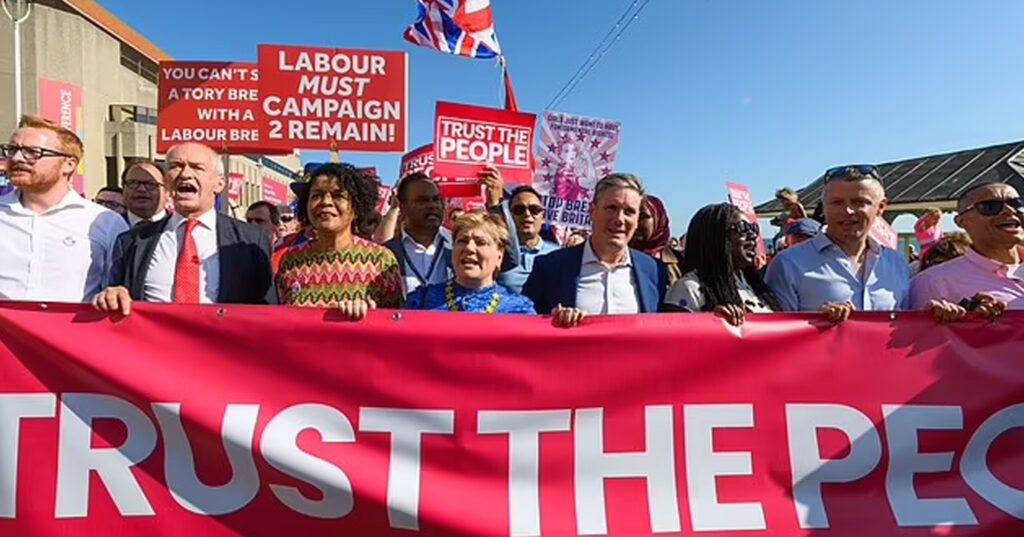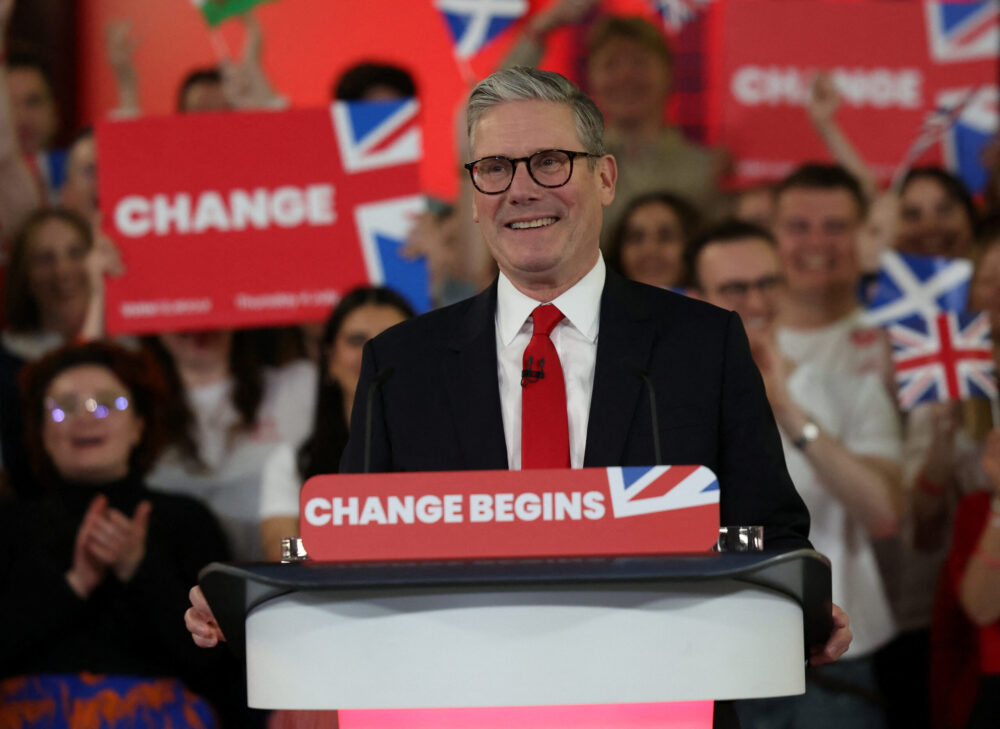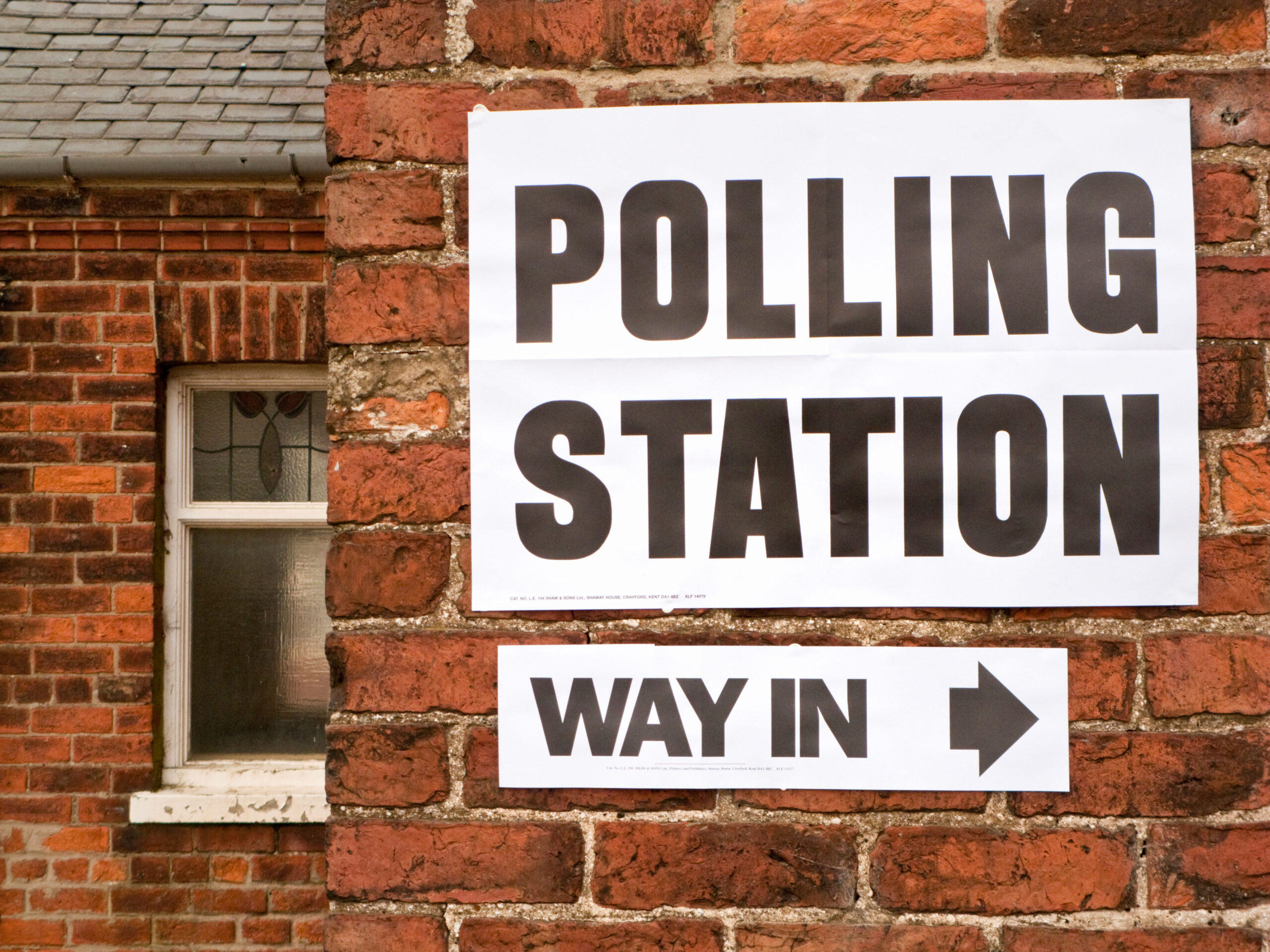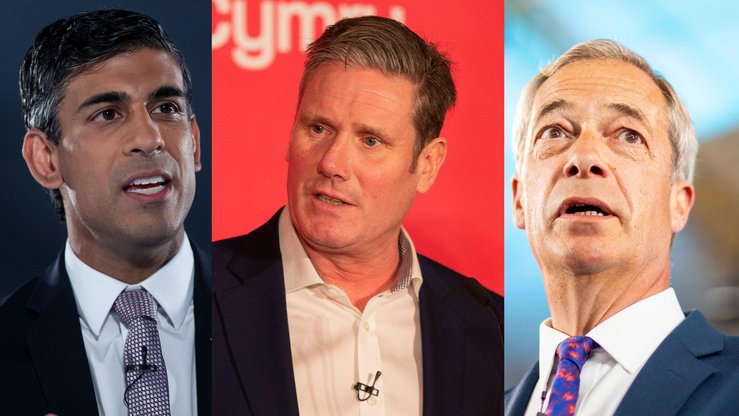
 Serialisation of Red Knight: The Unauthorised Biography Of Sir Keir Starmer, in The Mail on Sunday on 20 June 2021.
Serialisation of Red Knight: The Unauthorised Biography Of Sir Keir Starmer, in The Mail on Sunday on 20 June 2021.
A forensic new biography of the Labour leader reveals how his arrogant refusal to accept the referendum result unwittingly helped make Boris PM – and gave Britain the hard Brexit he most dreaded…
In the first part of our serialisation last week of Lord Ashcroft’s forensically researched new biography of Sir Keir Starmer, we told how the flute-playing, grammar school educated Labour leader has been accused of overplaying his working-class credentials.
Here, in the final part, we explain how the die-hard Remainer may well have unwittingly secured Boris Johnson’s 2019 General Election triumph and a much harder Brexit.
The job of Leader of the Opposition is often considered to be the worst in British politics. Neil Kinnock, who led the Labour Party from 1983 until 1992, once described it as ‘purgatory’.
To be so close to power and, at the same time, to be so far from it must surely be a form of torture for those who aspire to the highest office of the land. Today, with the Labour party going through a difficult period of self-examination, the job is arguably harder still.
When Sir Keir Starmer, a latecomer to elected politics, arrived in the Commons in 2015, aged 52, he had a profile that was significantly higher than that of most MPs as a result of his five-year term as Director of Public Prosecutions.
He raised his profile further in the four years after the Brexit referendum as Shadow Secretary of State for Exiting the European Union. Being stubbornly against Brexit marked him out as a hero for many on the liberal Left.
It’s now a little over a year since he became leader of his party, and it is undeniable that some commentators have begun to wonder if Labour’s outlook under him is too narrow. Others have questioned if he is the right person to lead Labour.
Some have doubted if Labour itself even has a future. Following an appalling set of election results last month, Tony Blair, Labour’s most electorally successful Prime Minister, attacked Sir Keir for lacking a ‘compelling economic message’. Blair added: ‘And the cultural message, because he is not clarifying it, is being defined by the “woke” Left.’
None of this has made Sir Keir’s job any easier.
What may have made the challenge greater still is that, beginning with Blair in 1994, four of Labour’s last five leaders have been long-term residents of North London.
The last three – Ed Miliband, Jeremy Corbyn and Sir Keir – live within a short drive of each other, feeding the narrative that the bond between Labour’s leadership and the provincial working-class vote on which it was built is torn and frayed.
It is not difficult to see why a view has taken hold that Labour has become a party run by and for people who embody the liberal and metropolitan elite.
The question is whether Sir Keir’s personality is big enough and well defined enough to achieve the undeniable popularity of both Blair and Corbyn, or whether he is closer to being more like Gordon Brown or Ed Miliband.
In other words, can his temperament, along with his experiences as both a politician and a lawyer, ever equip him to make the tricky transition from his current predicament to Downing Street?
IN April 2019, Prime Minister Theresa May invited Labour leader Jeremy Corbyn to take part in cross-party talks in an attempt to agree a unified approach to Brexit. Starmer, who in his role as Shadow Brexit Secretary had engaged the Tory Government in a long series of skirmishes since the vote to leave Europe, led the Labour delegation.
The meetings opened with some optimism. The Government team quickly discerned, however, that some of those in the Labour camp were more willing to compromise than others. While those in Corbyn’s close team ‘were sending out signals that they wanted a deal’, Starmer was insistent that an agreement had to include a second referendum.
One who was present remembers that Starmer conducted himself ‘incredibly professionally, politely, and with this overriding narrative that he’s seriously engaging in the talks with a view to finding an agreement’.
Suspicions were raised, however, over reports that appeared in the media after each meeting.
According to May’s former director of communications Sir Robbie Gibb, he and his opposite number in the Labour delegation, Seumas Milne, would work together on how to communicate the progress of talks to journalists.
‘What we put out I would run past Seumas first, and Seumas would run what they were going to say past me,’ Gibb recalls.
But, he says, ‘there were briefings to the BBC’s Today programme saying that the cross-party talks are going nowhere. ‘I’d get a call from the BBC saying, “I believe the talks are on the verge of collapse.”
‘”Well, who have you spoken to?”, I’d say. “Can’t say. It’s official sources.” It was completely disorientating. So the question is, who spoke to the journalists?’
Gibb is convinced the negative briefings came from Starmer or his team, and that the mixed messages highlighted conflicting attitudes within the Labour delegation. ‘There was obviously a division at the very heart of Labour during this period,’ Gibb says.
Some who saw the process from the Labour side believe Starmer was the most deal-resistant of the party’s negotiators, and that he prized the possibility of reversing Brexit through a second referendum above the chance to achieve a negotiated soft Brexit.
In December 2019, Boris Johnson’s Conservatives won the General Election with an 80-seat majority. Labour lost 60 seats, its worst performance since 1935, and Jeremy Corbyn announced his resignation. On January 23, 2020, Johnson’s withdrawal agreement became law, and eight days later the UK left the EU.
‘Starmer’s North London constituency was about 80 per cent Remain,’ observes former Labour MP John Mann. ‘Similar with Corbyn and Diane Abbott. So they’re surrounded in every part of their life by people who voted Remain.
‘I suspect people like Starmer were shocked at just how big the Tory victory was. But there was no attempt to talk to voters in the North of England by anybody outside the North of England.’
Some suspect Starmer’s own personal ambition helped explain his pursuit of the referendum- and-remain policy. ‘I’m not very impressed with him,’ says one former Labour MP who lost his Northern seat in 2019.
‘Starmer got into bed with the People’s Vote people, so as to get votes for the leadership among members of the London Labour party. And he wouldn’t do a deal with Theresa May, which was there to be done, and would have meant a soft Brexit.
‘So what happens? May has to resign, and we get a hard Brexit. All because he wanted to get himself elected Labour leader.’
Sir David Lidington, a Tory who supported Remain who was closely involved in trying to pass the May deal that would have kept Britain more closely aligned with the EU than the one ultimately concluded by Johnson, reflects that whatever the mix of motives, ‘Starmer is one of the authors of a very hard Brexit. There is no doubt in my mind about that’.
Perhaps Starmer’s stance on Brexit during this tumultuous period should not be a surprise, given his attitudes towards the EU going back to the beginning of his career.
In 1988, as a young barrister, he was invited by his boss and mentor, Geoffrey Robertson QC, to accompany him on a trip to the European Court of Human Rights at Strasbourg. This was to be Starmer’s introduction to human rights law – a field in which he would later specialise and which has without doubt helped forge his political attitudes.
Things got off to an embarrassing start for the novice, however. A story circulated afterwards that when they landed at Strasbourg airport, Robertson made it through customs successfully, but Starmer did not, having lost his passport en route.
Threatened by the local gendarmerie with being locked up and returned to Gatwick the next morning, Robertson had to phone the British consul, who was persuaded to go to the airport and vouch for the hapless Starmer so that he could remain in the city for 24 hours. Miraculously, this ploy worked and Starmer was able to see his boss in action in court.
The following year he accompanied the human rights campaigner Peter Tatchell by bus to a green socialist summer camp in France.
‘He was a fellow Left-wing activist,’ says Tatchell. ‘He struck me as very intelligent, passionate and committed to a radical vision of what Britain could be. He was well to the Left of Neil Kinnock, but he combined radicalism with pragmatism. He was quite in advance of Labour thinking at the time.’
Tatchell remembers discussing ideas with Starmer which were not considered mainstream in Labour circles in the 1980s. ‘Both he and I were already thinking about the potential of Europe-wide collaboration between socialist parties, trade unions and civil society groups to advance a progressive agenda.
This went against the grain of traditional Left-wing hostility towards what was then the EC. Keir was very strong on human rights. He also embraced new ideas on feminism, ecology and LGBT+ rights when some in the Labour Party – even on the Left – were still quite hesitant.’
As well as his work as a barrister, Starmer found time between 1987 and 1990 to take up a post as a legal officer for the National Council for Civil Liberties (NCCL), a watchdog group now known as Liberty.
In August 1989, Starmer gave press interviews in which he criticised proposals to introduce video identification parades for police hunting criminals. He also used his position as Liberty’s legal officer to lambast the police for their attempt to crack down on an open-air acid house party in Berkshire.
After officers from Thames Valley Police set up roadblocks and confiscated electronic equipment, Liberty backed the organisers in a court action. Starmer was quoted as saying that the police operation was ‘an incredible abuse of police powers’.
He is not thought to have been a regular attender of acid house parties himself, where taking proscribed drugs such as MDMA and LSD was not unusual, although one friend who prefers to remain anonymous says he was certainly not averse to ‘smoking weed’ at social occasions when he was a younger man.
In April 1990, Starmer attended the Appeal Court hearing in London of the so-called Winchester Three, sitting in as a legal observer on behalf of Liberty.
The case concerned three Irish citizens who, in 1988, had been found guilty at Winchester Crown Court of involvement in a plot to murder the then Northern Ireland Secretary, Tom King.
The trio, who had exercised their right to remain silent, were sentenced to 25 years in prison. Their convictions were overturned after serving just two years, however, because during the course of their original trial, the British Government had announced its intention to abolish the right to silence in terrorist cases in Northern Ireland. The Appeal Court ruled that King’s public support of this move and comments about terrorist suspects abusing the right to refuse to answer questions could have prejudiced the original trial.
This was a highly controversial decision and the group’s release from prison was heavily criticised by some, including by the former Master of the Rolls.
Starmer, however, was delighted. Although he obviously felt it right that this principled position had won the day, it could be argued that he overplayed his hand.
It is sobering to recall that three months later, another Conservative, Ian Gow, was murdered by an IRA bomb that was planted underneath his car outside his house in Sussex. Nobody has ever been convicted of his murder.
Over the course of the next 18 months or so, Starmer assembled a delegation of lawyers and arranged for them to visit Belfast on a four-day fact-finding mission under the umbrella of the Haldane Society of Socialist Lawyers to investigate criminal justice in the province under the Emergency Powers, which were still in place.
Starmer and his team met High Court and Appeal Court judges; they interviewed prisoners; they spoke to the Independent Police Complaints Commission and the Standing Advisory Committee on Human Rights; and they spent time gathering material from solicitors and researchers.
In mid-1992, a report detailing their observations was published. It concluded that the Diplock courts in Northern Ireland set up specifically to deal with political and terrorism-related cases were ‘failing to secure reliable convictions based on properly tested evidence’ and should be abandoned.
It also claimed that Catholic detainees were being subjected to interrogation techniques which amounted to physical and psychological torture.
Given that Starmer later became adviser to the Board of the Police Service of Northern Ireland, it is noteworthy that the Haldane Society had a clear policy at that time of supporting a united Ireland. ‘We call for British withdrawal,’ the report declared. ‘We did not hide the fact we had such [a] policy.’
Even if Starmer did not write the entire report himself, it seems most unlikely that as the serious-minded convenor of the trip, he did not know about its contents. This fuels questions about how neutral Starmer was, then and subsequently, on Northern Ireland issues and gives pause for thought when it comes to assessing to what extent his own feelings about it have ever been scrutinised or understood.
In October 1992, he was a junior member of a team that tried unsuccessfully to defend two murderers at the High Court who had been released on parole, then sent back to prison for leading an unsettled lifestyle.
This was exactly the sort of project in which Starmer appears to have relished being involved. With that said, it throws up a rather more challenging question about certain beliefs he has held regarding imprisonment in general.
One much respected lawyer recalls with incredulity an occasion around this time when Starmer shared his views on this subject. According to this person, he certainly seemed keen to convert the idea of civil liberties for all into a practical reality.
‘I remember sitting in the pub with him listening to him seriously say he doesn’t believe in imprisonment for anything, ever,’ reports the lawyer. ‘We all say stupid things when we’re young, but he wasn’t that young. He was a practising barrister. He wasn’t a teenager.’
HIS dearly held beliefs saw Starmer two decades later invited by his friend Ed Miliband to chair a Labour Party task force on victims’ rights. It was, in effect, a public demonstration of his intention to move into politics.
Yet before he could do so, there was another, more pressing, matter to tackle. Following the end of his five-year contract as Director of Public Prosecutions in 2013, he had returned to private practice that year.
But as he well knew, it is customary for retiring male DPPs to be honoured with a knighthood. He now had to decide whether he would go against his progressive instincts by accepting a title he would keep for the rest of his life.
He had already joined the ranks of the Establishment by becoming DPP, but would there be any consequences for him politically if he cemented this status with a knighthood?
What would his Labour-supporting parents or friends say?
Indeed, a video from 2005, unearthed by the Guido Fawkes political website, saw Starmer once musing: ‘I got made a Queen’s Counsel, which is odd since I often used to propose the abolition of the monarchy.’
One who knows him well says he certainly wrestled with the problem. ‘Keir has always been cautious,’ says the friend. ‘Some advised him not to take a knighthood, for the sake of his Labour career. But of course he did.
‘They all do – even republicans and Left-wingers, who are told it’s expected of them when, for example, they become judges. He prefers not to use it, but it probably provides a certain reassurance to Middle England.’
The Cabinet Office has refused to confirm who nominated Starmer for his knighthood. But the statement announcing it was published in the 2014 New Year Honours list, and the investiture took place at Buckingham Palace the following February.
In 2015, Starmer told his local newspaper: ‘I’ve never liked titles. When I was DPP, everyone called me “director” and I said, “Please don’t call me ‘director’, call me Keir Starmer’.” It’s a very similar battle now.’
Of course, accepting a knighthood and then being reluctant to use it does leave him open to accusations of what Boris Johnson has called ‘cakeism’ – that is to say, having your cake and eating it.
But others admire him for his principles.
‘I feel his integrity very strongly,’ says Lord Goldsmith, who has known Starmer since his time as Attorney General in the Blair Government. ‘His decency I feel very strongly. But it’s interesting that after he’d been DPP he didn’t go about as Mr Rentaquote, which some people have done.
‘He wasn’t looking for opportunities to have people talking about Keir Starmer. He is genuinely concerned about doing the job well and not promoting himself.’
If Starmer, now 58, has not so far been a dazzling figure in public, this need not rule him out of contention to become Prime Minister. ‘Will he ever be an orator like Neil Kinnock?’ says Goldsmith. ‘It’s very hard to achieve that particular style of oratory.’
A somewhat bland persona, meanwhile, can actually be a reassuring feature for leaders on the Left. An old party hand says: ‘You can be a much more radically successful leader for the Labour Party if you feel like much more of an Establishment person – whereas Labour leaders who delighted in their taking-to-the-barricades personas haven’t made it to No 10.
‘He has something in common with those Labour leaders who went on to become Prime Minister because his objective has not been “I have a lifelong ambition to be leader of the Labour Party”. It’s more “I have a lifelong ambition to be a Labour Prime Minister”.’
To come close to achieving this, Starmer will need to show he is setting the direction of the party without interference from the dissenters. If he is to succeed, he faces a choice: will he aim to keep both sides of his party happy, trying to negotiate with Labour’s factions with lawyerly logic? Or is he prepared to do what it takes to reposition the party and face down the Corbynistas?
Expelling his predecessor over antisemitism was a bold step, but we don’t yet know if he has the nerve to have a serious falling-out with the hard Left when it comes to making big calls over economic policy or foreign affairs. Winning an Election will mean wielding his authority and proving his party has changed.
Labour’s rebrand has already begun, with the announcement this week of its ‘Stronger Together’ slogan as a radical policy over- haul begins.
Will it work for Keir Starmer? Can he go all the way?
Only time will tell.
- Abridged and edited extract from Red Knight: The Unauthorised Biography of Sir Keir Starmer, by Michael Ashcroft, published by Biteback on August 19 at £20. To pre-order a copy for £17.80, go to mailshop.co.uk/ books, click here or call 020 3308 9193 before July 4. Free UK delivery on orders over £20.


